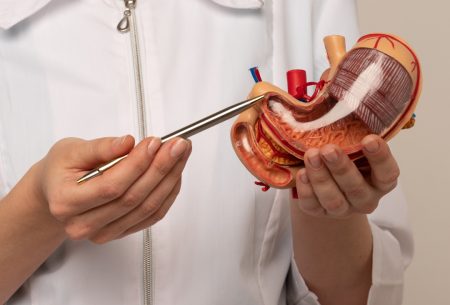What is PCOS?
Polycystic ovary syndrome (PCOS) is a complex hormonal condition which affects around 1 in 10 women in the UK.
The hormonal changes that can happen in women with PCOS include:
- Excess androgen: Androgens are a group of hormones which are present in everyone, usually at higher levels in men, promoting the growth of facial and body hair (e.g. testosterone).
- Insulin resistance: Insulin is another hormone which is produced in the body, in this case to reduce sugar levels within the blood after eating a meal. This is so that the sugar from your meal can be used for energy. If the sugar in your blood remains high, then more insulin is produced to reduce this sugar level and use the energy. High levels of insulin increase testosterone (an androgen) – so these two can be linked!
How is it diagnosed?
Diagnosis is based on a woman having one or more of the following three features:
- Excess androgens
- Polycystic ovaries: the clue is in the name? Perhaps not – these ‘cysts’ are actually different to usual cysts which may grow in size, burst or even develop into cancer. The cysts within PCOS remain small. The cysts within PCOS are just underdeveloped tissues, whereas true cysts are fluid-filled and may grow. You may be surprised to hear that not all women with PCOS have polycystic ovaries
- A lack of ovulation: eggs not being released from the ovaries
What are the symptoms?
The above hormonal changes in women, can result in some (or all) of the following notable changes:
- Oily skin
- Acne
- Thinning hair
- Weight gain
- Excessive hair on the face, chest, back or buttocks
- Difficulty getting pregnant
- Irregular or no periods
These changes can be really difficult to manage emotionally, especially as most women develop these symptoms during their late teens or early 20’s where we tend to be very image conscious! The rates of anxiety and depression in PCOS are three times that of the general population and this is a really important factor which should not be overlooked when we are treating PCOS.
What causes PCOS?
There is a genetic component, but the exact causes are still unknown.
What are the treatment options?
The treatment for PCOS is a focus upon symptom management. This should include dietary and lifestyle factors in every case and often includes medications or in rare instances a surgical procedure.
Medication may include tablets such as metformin, a medication also used in type 2 diabetes to help tackle insulin resistance. Other commonly prescribed medications include the contraceptive pill to help regulate hormones and medications which work by directly reducing androgens within the diet, for example spironolactone.
If you need medications, diet and lifestyle can have a hugely positive effect and may mean you can thrive on a lower dose of medication.
Surgery is only in certain circumstances and is an option for those who do not respond to medicine. This is a type of key-hole surgery which removes tissue producing androgens.
How can diet and lifestyle ease symptoms of PCOS?
Our goals are to prevent an increase in insulin resistance through a healthy diet and regular exercise. We also know that those with PCOS have an increased risk of diabetes and cardiovascular disease, where diet and lifestyle are key players in prevention.
Exercise is a fantastic tool to help manage the symptoms of PCOS as well as having a positive impact on mood. Find something you enjoy and can build into your routine consistently!
If you are above the healthy weight range, a small level of weight loss can be helpful in PCOS. There is also some evidence that a lower carbohydrate diet (not complete exclusion, just a small reduction) can be beneficial and increase fat tissue loss to a greater level in PCOS.
There is some early research into ketogenic diets in PCOS, but caution! Ketogenic diets can increase blood fat levels, which can also have a negative effect on cardiovascular disease risk and so I do not recommend these. What the evidence does support in a healthier way is a Mediterranean style diet, including oily fish, nuts and seeds, olive oils and complex carbohydrates.
Complex carbs: We know that higher fibre carbohydrates can be beneficial in PCOS in comparison to the white processed options as they do not cause such a large increase (spike) in blood sugar levels.
We also know there is an association between gut bacteria and PCOS, so increasing plant-based diversity and aiming for 30+ different plant-based products per week is important. Some people find concentrating on healthy additions to the diet (rather than exclusions) can be more beneficial in the long term as it reduces food cravings, concentrating on changes from a positive angle.
Seed cycling
This is a practice often carried out by nutritional therapists, which involves matching specific seeds to certain phases within your cycle. The goal is to regulate your hormones and therefore decrease symptoms associated with PCOS. The suggestion is to consume flaxseeds and sunflower seeds in phase 1 of your cycle (days 1-14) and sesame seeds and sunflower seeds in phase 2 of your cycle (days 15-29). What’s tricky in PCOS; it that often cycles are irregular and so it can be difficult to separate phases 1 and 2. It is likely that the benefits seen with these seeds are due to their fibre and omega 3 content, rather than timings of specific seeds, as we know increased fibres and omega 3’s can be beneficial and reduce symptoms in those with PCOS.
Key nutrients to consider
- Iron. The recommended iron intake in women is about twice that of men, based on blood loss from their monthly cycle. Many women with PCOS have heavy or long periods. If you fall into this category, you should certainly have your iron and iron stores (ferritin) checked and increase dietary sources or supplement if necessary
- Vitamin D. Studies show that PCOS symptoms are worse in those with vitamin D deficiency. There are many factors to consider here and it may not be as simple as vitamin D improving symptoms, but it is certainly worth checking your vitamin D levels and we should all be supplementing with a minimum of 1000IU vitamin D per day from the months of September to April in the UK as the sun isn’t close enough to penetrate our skin and produce vitamin D. See our previous post on Vitamin D for more information.
- Vitamin B12. Medications such as metformin can deplete B12 so if you are taking this you may want to consider a B12 measure. This should be looked at with a dietitian as the blood measure you have checked in the NHS looks at active and inactive b12, so it is important to look at the figure along with clinical judgement
What about supplements?
There are a whole range of supplements marketed for those with PCOS – but which are worth it?!
Inositol: there is a growing and promising body of evidence that inositol can be effective alongside the treatment options outlined above. It is important that this is used as well as, rather than instead of medications or dietary and lifestyle changes. Discuss this with a trusted health care professional!
N-acetyl-cysteine (NAC): There is some evidence to show it can be of benefit for short term use when trying to conceive and to help induce ovulation, so one to consider if you are looking to conceive! There are no long-term studies with this and again, this is one to discuss with your health care professional.
Omega 3 fatty acids: There are some short-term studies which suggest this may be of benefit. Evidence isn’t conclusive yet, but what we do know is a good level of omega 3’s in the diet can be of benefit. I recommend 2 portions of oily fish per week. If you don’t eat fish you could consider increasing your intake of walnuts, flaxseeds and chia, although these will provide much lower levels than fish.
There are a range of other supplements promoted for PCOS which can be considered on an individual basis.
Take Home
Managing PCOS can be tricky as there’s various factors to be considered. If you would like some personalised advice, we can support your journey and symptoms of PCOS here at The Gut Health Clinic!












